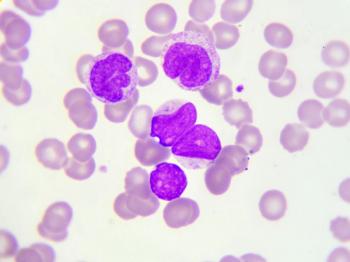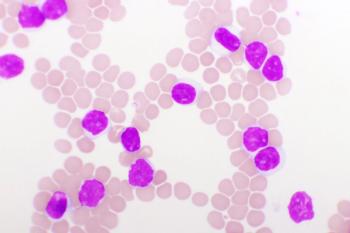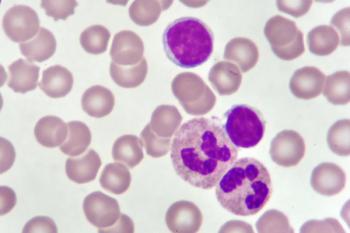
CancerNetwork®’s podcast dives into an article focused on treatment options for older, transplant-ineligible patients with multiple myeloma.

Your AI-Trained Oncology Knowledge Connection!


CancerNetwork®’s podcast dives into an article focused on treatment options for older, transplant-ineligible patients with multiple myeloma.

Look back at some of the important news and notes from last week you might have missed in the world of oncology. The FDA granted priority review to zanubrutinib, while 2 features from the journal ONCOLOGY® published on belantamab mafodotin and renal cell carcinoma, respectively, were popular with readers.

Solid nodules, peritumoral interstitial thickening, and pleural contact can play a role in carefully selecting optimal patients to undergo sublobar resection instead of more extensive surgery.

The interim activity and safety data observed were positive for both FT516 and FT538 monotherapy for patients with relapsed or refractory acute myeloid leukemia.

Data extrapolated from healthy lifestyle scores and polygenic risk scores found that healthy lifestyle changes were associated with a greater reduction in the risk in developing colorectal cancer for patients with a high genetic risk of disease development.

BeiGene’s press release details the positive progression-free survival data observed with the combination of tislelizumab plus chemotherapy compared with placebo plus chemotherapy for patients with recurrent or metastatic nasopharyngeal cancer.

Results of a study found that ctDNA could provide an immediate benefit for mitigating selection bias in DLBCL-centered clinical trials.

The combination of alpelisib and fulvestrant maintained a tolerable safety profile for patients with PIK3CA-mutated, hormone receptor–positive, HER2-negative advanced breast cancer who progressed after previous treatment with a CDK4/6 inhibitor.

Alessi detailed his research into cancer aneuploidy and its predictive capabilities for treating patients with non–small cell lung cancer.

Research utilized a convenience sample of patients to determine loneliness during the COVID-19 pandemic, emphasizing factors including anxiety, depression, and fatigue, among other things.

Look back at some of the important news and notes from last week you might have missed in the world of oncology, featuring 2 FDA breakthrough device designations and a manuscript from the journal ONCOLOGY® focusing on molecular testing practices in pancreatic adenocarcinoma.

Copur spoke with CancerNetwork® about the potential for a new era of cancer treatment and immunotherapy with the recent approval of mRNA vaccines to treat COVID-19.

The results from a trial evaluating the Genomic Prostate Score did not find an increase in active surveillance acceptance amongst a population of predominantly Black men with favorable-risk prostate cancer.

Investigators assessed a 2-part study to investigate the prognostic impact of certain clinical features and genomic markers for rucaparib in treating patients with relapsed high-grade ovarian carcinoma.

The long-term equivalence trial examined the rates of ipsilateral breast tumor recurrence for patients receiving electron intraoperative radiotherapy and whole-breast irradiation at 5-, 10-, and 15-year follow-up times.

Investigators observed a survival benefit for patients receiving lenvatinib who had radioiodine-refractory differentiated thyroid cancer with lung metastases of 1 cm or greater.

E. David Crawford, MD, spoke about the use of transitional disease and other redefined disease states in prostate cancer, while Rana McKay, MD emphasized the need for clinical trials to validate current treatments and practices.

Look back at some of the important news and notes from last week in the world of oncology, featuring an FDA approval and a Journal ONCOLOGY® article on prostate cancer disease states.

Reducing caloric and nutrient intake for patients who were overweight or obese and undergoing induction for B-cell acute lymphoblastic leukemia was feasible and improved patient response, according to an early-phase trial.

The 3-year follow-up analysis of 4 treatment groups who received CNS prophylaxis found a decreased incidence of CNS relapse for patients with high-risk diffuse large B-cell lymphoma, although the data were not statistically significant.

The KATHERINE trial found a clinical benefit without increasing the risk of CNS recurrence for patients with HER2-positive early breast cancer treated with T-DM1.

Research focusing on first-line single-agent carboplatin was terminated due to an independent data monitoring committee’s recommendation after worse survival outcomes were observed in adult patients with ovarian cancer.

A retrospective study evaluating over 3.9 million children found that Down syndrome was a strong risk factor for the development of childhood leukemia and has a stronger association with acute myeloid leukemia than previously recorded.

Look back at some of the important news and notes from last week in the world of oncology, featuring articles from live events, the latest issue of the Journal ONCOLOGY®, and an episode of “Oncology Peer Review On-The-Go.”

A phase 3 trial found that pembrolizumab for patients with microsatellite instability–high or mismatch repair–deficient metastatic colorectal cancer significantly improved health-related quality of life compared with chemotherapy.

Data in the Journal of Clinical Oncology found that low-intensity chemotherapy without additional intensified pegaspargase cured almost all patients treated on the Children’s Oncology Group AALL0331 trial.

The phase 2 trial showed that tipifarnib was effective for patients with metastatic head and neck squamous cell carcinoma who have limited therapeutic options available.

The interim analysis showed positive response and safety data in adult patients with relapsed or refractory CLL or SLL treated with zanubrutinib compared with those receiving ibrutinib.

The phase 2 trial investigated the toxic effects, PSA responses, and resulting quality of life measures from SBRT and SDRT, finding that the latter has the potential to be a feasible alternative treatment option for prostate cancer.

Data examining thermal ablation for women with a total of 119 metastatic gynecologic tumors found the therapy was safe and effective in the local control of these tumors.